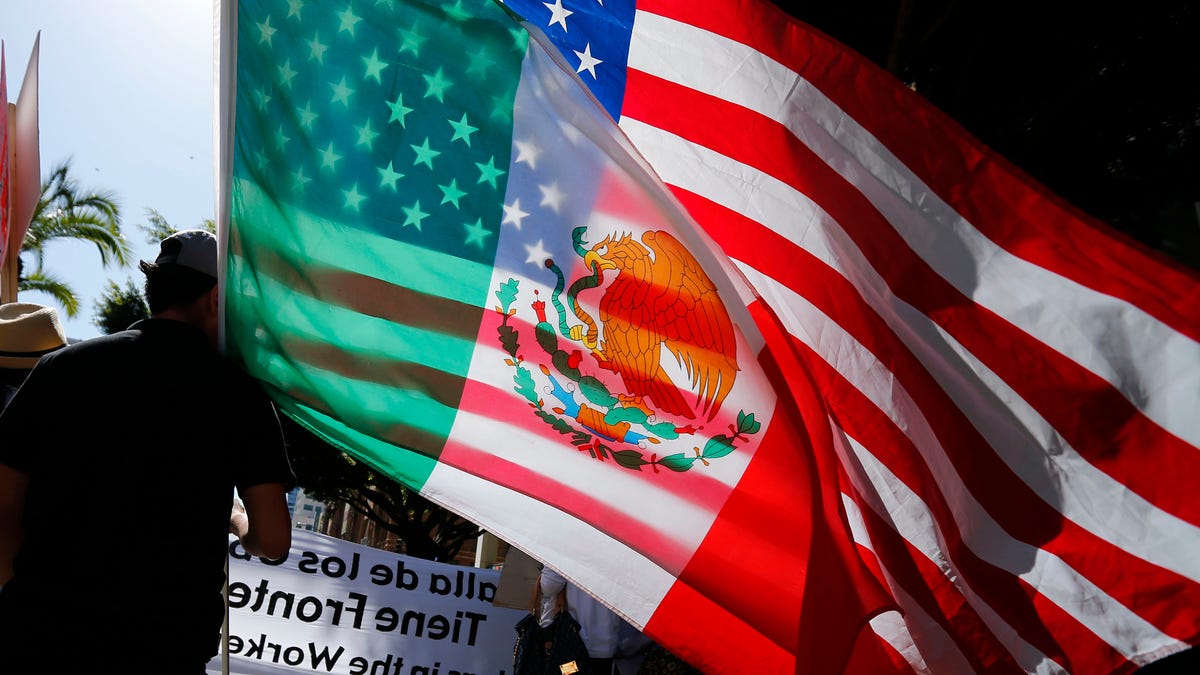
May 1, 2013: A youth carries national flags of the U.S. and Mexico through the streets of San Diego, during a demonstration about workers rights and immigration reform. (Reuters)
WASHINGTON – The U.S. Department of Labor is coming under fire from some who say a $1.4 million grant to the Mexican government to support anti-discrimination laws in that country is a waste of U.S. time, money and resources.
“Is there no end to the madness?” Judicial Watch writes on its website. “Each year, Americans are forced to pay tens of billions of dollars to educate, feed, house, incarcerate and medically treat illegal aliens – most of them from Mexico – in the U.S. and now we’re sending cash south of the border for a cause that’s hardly ours to fund.”
The goal of the grant, according to the Department of Labor, is to increase compliance with the expanded protections against labor discrimination under Mexican labor law, with a specific focus on combating gender discrimination, forced pregnancy testing, sexual harassment and discrimination based on sexual orientation.
"Countries like Mexico are making welcome progress in reforming laws to better protect workers from discrimination and harassment based on gender or sexual orientation," Carol Pier, deputy undersecretary of labor for international affairs, said in a written statement announcing the grant. "This project will support the Mexican government's efforts to more effectively enforce such non-discrimination provisions of the Mexican Federal Labor Law Reform of 2012."
[pullquote]
Much of the money will go toward improving enforcement by labor inspectors in Mexico, increasing employer participation in government social compliance programs and raising public awareness of the recent legal reforms on labor discrimination.
“It may seem bizarre that our Labor Department prioritizes issues in a foreign country, but this has been going on for years and the allocations for causes abroad have increased tremendously under President Obama,” JW writes.
The deadline for the grant was Nov. 7, and the winner will be announced before Dec. 31. The duration of the project is up to 3 years – or 36 months – from the effective date of award, according to the grant.
The Labor Department touts on its website that The Mexican Federal Labor Law Reform of 2012 has been called “one of the most significant legislative developments of the administration led by former President Felipe Calderon.”
In Mexico, pregnancy testing was cited as the No. 1 discrimination against women. In November 2012, the country passed sweeping reforms to its federal labor laws. Despite the new reforms on the books, implementing them has been difficult for the country.
One significant challenge to effective enforcement, according to the grant proposal, is the small number of workers filing any labor discrimination with authorities. Mexican government officials say abuse cases are often underreported, in part, “because workers are sometimes encouraged to file discrimination cases under more general labor law provisions, such as the ban on unjustified firing, since discrimination cases are so hard to prove.”
JW launched an investigation that showed that in the last few weeks of 2012 the Labor Department dedicated nearly $40 million to global programs that will produce little, if any, benefit to the U.S. The programs, which included formal agreements with Mexico, Nicaragua, Costa Rica that the U.S. would vow to protect the rights of migrants from those countries who work in the U.S., caused some backlash when made public.
“About one-fourth of the money went to combat the labor abuse of ‘vulnerable groups’ in Ecuador and Panama, specifically Afro-descendant, indigenous and migrant populations,” JW said, adding that the “unprecedented initiatives” to help illegal immigrants have proven costly to American taxpayers.”



